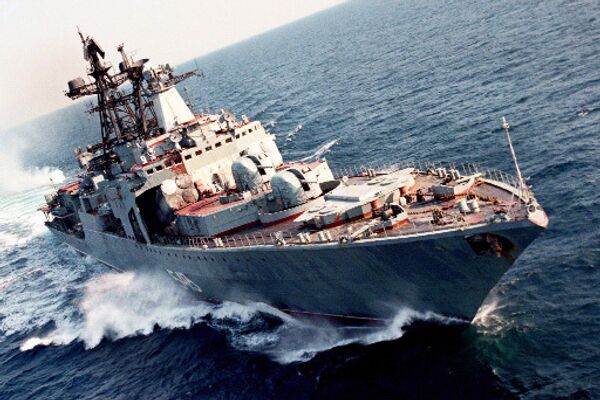On February 24, Russia's Pacific Fleet dispatched the large anti-submarine warship Marshal Shaposhnikov, a rescue tugboat and the Pechenga tanker to fight pirates off the Somali coast.
In addition to their crew, there are marines on board the auxiliary vessels and the Marshal Shaposhnikov is carrying two helicopters. The vessels, led by Captain 1st Rank Ildar Akhmerov, constitute the fourth task force that Russia has sent to Africa to ensure navigation safety.
Russian warships joined the fight against Somali pirates in the fall of 2008, when the Neustrashimy frigate was sent to the Gulf of Aden from the Baltic Sea. The frigate, currently keeping those waters safe for navigation, will be replaced by the group led by the Marshal Shaposhnikov.
In total nearly 20 countries, including leading NATO member states, India, China and several Arab countries, have sent warships to Somali coast. Three groups of warships from Russia's Pacific Fleet have convoyed over 100 merchant vessels from 26 countries and repelled more than 20 pirate attacks.
During its second tour of duty in the Gulf of Aden, the Neustrashimy accompanied 15 convoys of over 50 tankers and other merchant vessels from different countries.
But these international efforts have not been entirely effective. Pirates staged 111 attacks, seizing 42 ships and 815 crewmembers off the Somali coast in 2008, and attempted 217 attacks, seizing 47 vessels and 867 crewmembers in 2009. This indicates that the pirates were less successful in 2009, when they seized one vessel per 4 or 5 attacks, than they were the previous year when they seized one vessel per two or three attacks.
However, this is not evidence of a piracy crisis as such, but only of tactical victories won by ship owners and warships. Strategically, the number of pirate attacks is growing and there are no signs of a decline in their activity.
The pirates are acquiring better equipment and boats, modern weapons and satellite communication and navigation systems. They are also improving their tactics. When merchant vessels stopped approaching the shore, the pirates started attacking them on the high seas.
Such attacks cannot succeed unless the pirates have information about the vessels' routes and timetables, which means that they have an extended network of informers. Sea piracy has become a lucrative business with multi-million dollar revenues and only minor expenditures given the dire poverty in Somalia and the low cost of weapons and equipment available on the global market.
Those countries with fleets off the Somali coast are still unable to agree a common strategy on fighting the pirates and on what to do with the detainees.
European legislation does not stipulate the harsh punishment of pirates, and they do not fear a prison term because it offers them an opportunity to settle in Europe after serving their sentence.
The law prohibits European seamen from turning the pirates over to Arab countries, where by law such offenses are punishable by the death penalty. Russian and Asian seamen have more leeway, and usually deliver the detained pirates to Yemen or neighboring Arab countries.
A considerably larger number of pirate boats were sunk in 2009 when NATO warships resorted to extreme measures more often. However, that response is unlikely to reduce the number of pirate attacks.
The only military solution to the problem is a large-scale operation against the pirates' main coastal bases, which requires the use of much larger groups of forces.
But since piracy is a highly lucrative business and there is a long line of hungry Somalians wishing to become pirates, the problem can only be resolved by normalizing the situation in Somalia. The country needs a functioning economy that would dramatically reduce the number of people willing to take up piracy as a career.
This would take several years to accomplish and would cost much more than the current fight against pirates, or even the ransom some countries prefer to pay them for ships seized.
It seems that the international community is leaning toward paying the ransoms, refusing to admit the absurdity of the situation.
The opinions expressed in this article are the author's and do not necessarily represent those of RIA Novosti.
MOSCOW (RIA Novosti military commentator Ilya Kramnik)



